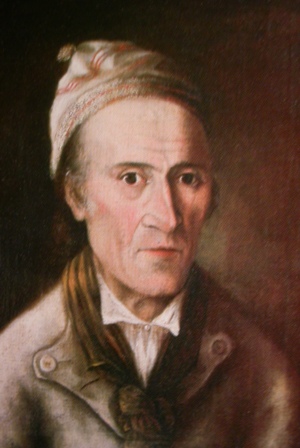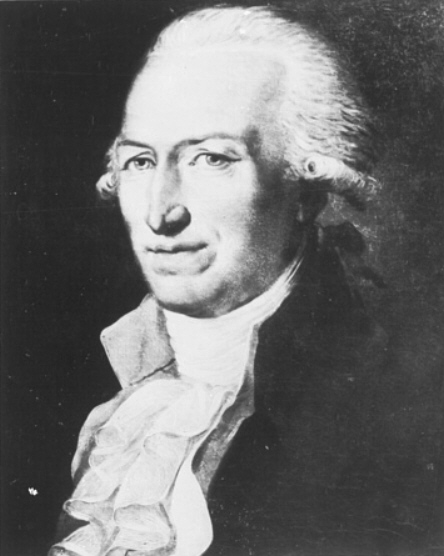|
Ulrich Bräker
Ulrich Bräker (1735–1798) was a Swiss people, Swiss autodidact, writer and diarist, known for his autobiography, published in 1789, widely received at the time as the voice of an unspoiled State of nature, "natural man" of the lower classes, based on the title of which Bräker became known as "The Poor Man of Toggenburg" (''Der arme Mann im Toggenburg''). Bräker was born as the oldest of eight siblings in Scheftenau, Wattwil, Toggenburg (at the time a territory owned by the Abbey of St. Gall). After the hofname, estate name of his birth house, he was also known as ''Näppis-Ueli'' (''Näbisuli''). He was the son of Johannes Bräker (''Näbishans'', 1708–1762). During 1741–54, the family worked the remote estate of ''Dreyschlatt''. Ulrich was educated in literacy and basic arithmetics during ten weeks each winter, working as a goatherd for the rest of the year. In 1754, the family moved to Wattwil, where Ulrich worked various jobs. In 1755, he entered the service of ... [...More Info...] [...Related Items...] OR: [Wikipedia] [Google] [Baidu] |
Ulrich Braeker, Portrait Ca
Ulrich (), is a German given name, derived from Old High German ''Uodalrich'', ''Odalric''. It is composed of the elements ''Othala rune, uodal-'' meaning "(noble) heritage" and ''-rich'' meaning "rich, powerful". Attested from the 8th century as the name of Alamannic nobility, the name is popularly given from the high medieval period in reference to Saint Ulrich of Augsburg (canonized 993). There is also a surname Ulrich. It is most prevalent in Germany and has the highest density in SwitzerlandThis last name was found in the United States around the year 1840Most Americans with the last name were concentrated in Pennsylvania, which was home to many Pennsylvania Dutch, German immigrant communities. Nowadays in the United States, the name is distributed largely in the Pennsylvania-Ohio regio History Documents record the Old High German name ''Oadalrich'' or ''Uodalrich'' from the later 8th century in Alamannia. The related name ''Adalric'' (Anglo-Saxon name, Anglo-Saxon cognate '' ... [...More Info...] [...Related Items...] OR: [Wikipedia] [Google] [Baidu] |
Pietism
Pietism (), also known as Pietistic Lutheranism, is a movement within Lutheranism that combines its emphasis on biblical doctrine with an emphasis on individual piety and living a holy Christian life, including a social concern for the needy and disadvantaged. It is also related to its non-Lutheran (but largely Lutheran-descended) Radical Pietism offshoot that either diversified or spread into various denominations or traditions, and has also had a contributing influence over the interdenominational Evangelical Christianity movement. Although the movement is aligned exclusively within Lutheranism, it had a tremendous impact on Protestantism worldwide, particularly in North America and Europe. Pietism originated in modern Germany in the late 17th century with the work of Philipp Spener, a Lutheran theologian whose emphasis on personal transformation through spiritual rebirth and renewal, individual devotion, and piety laid the foundations for the movement. Although Spener di ... [...More Info...] [...Related Items...] OR: [Wikipedia] [Google] [Baidu] |
Swiss Writers In German
Swiss may refer to: * the adjectival form of Switzerland * Swiss people Places * Swiss, Missouri *Swiss, North Carolina * Swiss, West Virginia * Swiss, Wisconsin Other uses *Swiss-system tournament, in various games and sports *Swiss International Air Lines **Swiss Global Air Lines, a subsidiary *Swissair, former national air line of Switzerland *.swiss alternative TLD for Switzerland See also *Swiss made, label for Swiss products *Swiss cheese (other) *Switzerland (other) *Languages of Switzerland, none of which are called "Swiss" *International Typographic Style, also known as Swiss Style, in graphic design *Schweizer (other), meaning Swiss in German *Schweitzer Schweitzer is a surname. Notable people with the surname include: * Albert Schweitzer, German theologian, musician, physician, and medical missionary, winner of the 1952 Nobel Peace Prize * Anton Schweitzer, opera composer * Brian Schweitzer, forme ..., a family name meaning Swiss in German ... [...More Info...] [...Related Items...] OR: [Wikipedia] [Google] [Baidu] |
People From Toggenburg
A person ( : people) is a being that has certain capacities or attributes such as reason, morality, consciousness or self-consciousness, and being a part of a culturally established form of social relations such as kinship, ownership of property, or legal responsibility. The defining features of personhood and, consequently, what makes a person count as a person, differ widely among cultures and contexts. In addition to the question of personhood, of what makes a being count as a person to begin with, there are further questions about personal identity and self: both about what makes any particular person that particular person instead of another, and about what makes a person at one time the same person as they were or will be at another time despite any intervening changes. The plural form " people" is often used to refer to an entire nation or ethnic group (as in "a people"), and this was the original meaning of the word; it subsequently acquired its use as a plural ... [...More Info...] [...Related Items...] OR: [Wikipedia] [Google] [Baidu] |
1798 Deaths
Events January–June * January – Eli Whitney contracts with the U.S. federal government for 10,000 muskets, which he produces with interchangeable parts. * January 4 – Constantine Hangerli enters Bucharest, as Prince of Wallachia. * January 22 – A coup d'état is staged in the Netherlands (Batavian Republic). Unitarian Democrat Pieter Vreede ends the power of the parliament (with a conservative-moderate majority). * February 10 – The Pope is taken captive, and the Papacy is removed from power, by French General Louis-Alexandre Berthier. * February 15 – U.S. Representative Roger Griswold (Fed-CT) beats Congressman Matthew Lyon (Dem-Rep-VT) with a cane after the House declines to censure Lyon earlier spitting in Griswold's face; the House declines to discipline either man.''Harper's Encyclopaedia of United States History from 458 A. D. to 1909'', ed. by Benson John Lossing and, Woodrow Wilson (Harper & Brothers, 1910) p171 * March & ... [...More Info...] [...Related Items...] OR: [Wikipedia] [Google] [Baidu] |
1735 Births
Events January–March * January 2 – Alexander Pope's poem '' Epistle to Dr Arbuthnot'' is published in London. * January 8 – George Frideric Handel's opera '' Ariodante'' is premièred at the Royal Opera House in Covent Garden, London. * February 3 – All 256 people on board the Dutch East India Company ships '' Vliegenthart'' and ''Anna Catherina'' die when the two ships sink in a gale off of the Netherlands coast. The wreckage of ''Vliegenthart'' remains undiscovered until 1981. * February 14 – The '' Order of St. Anna'' is established in Russia, in honor of the daughter of Peter the Great. * March 10 – The Russian Empire and Persia sign the Treaty of Ganja, with Russia ceding territories in the Caucasus mountains to Persia, and the two rivals forming a defensive alliance against the Ottoman Empire. * March 11 – Abraham Patras becomes the Governor-General of the Dutch East Indies (now Indonesia) upon the death of Dir ... [...More Info...] [...Related Items...] OR: [Wikipedia] [Google] [Baidu] |
Christoph Blocher
Christoph Wolfram Blocher (; born 11 October 1940) is a Swiss industrialist and politician who served as a Member of the Swiss Federal Council from 2004 to 2007. A member of the Swiss People's Party (SVP/UDC), he headed the Federal Department of Justice and Police. As an industrialist, he became wealthy as CEO and majority shareholder in the EMS-Chemie corporation, now run by his daughter, Magdalena Martullo-Blocher. A controversial figure, Blocher is known for his role in transforming Swiss politics, shifting it to the right, as well as the Swiss People's Party, which has become "the dominant force in national politics". As he "developed a eurosceptic and anti-immigration agenda that has shaken up the cozy post-war consensual system prevailing in neutral Switzerland", Blocher served as the ''de facto'' leader of the SVP and a symbol of the party, holding its vice presidency from 2008 until 2018. Early life and education The son of a pastor, Blocher was born in 1940, the seven ... [...More Info...] [...Related Items...] OR: [Wikipedia] [Google] [Baidu] |
French Invasion Of Switzerland
The French invasion of Switzerland (French: ''Campagne d'Helvétie'', German: ''Franzoseneinfall'') occurred from January to May 1798 as part of the French Revolutionary Wars. The independent Old Swiss Confederacy collapsed from the invasion and simultaneous internal revolts called the "Helvetic Revolution". The Swiss Ancien Régime institutions were abolished and replaced by the centralised Helvetic Republic, one of the sister republics. Background Before 1798, the modern region of Vaud belonged to the Canton of Bern, to which it had a dependent status. Moreover, the majority of Francophone Catholic Vaudois felt oppressed by the German-speaking Protestant majority of Bern. Several Vaudois patriots such as Frédéric-César de La Harpe advocated for independence. In 1795, La Harpe called on his compatriots to rise up against the Bernese aristocrats, but his appeal fell to deaf ears, and he had to flee to Revolutionary France, where he resumed his activism. In late 1797, Frenc ... [...More Info...] [...Related Items...] OR: [Wikipedia] [Google] [Baidu] |
Seven Years' War
The Seven Years' War (1756–1763) was a global conflict that involved most of the European Great Powers, and was fought primarily in Europe, the Americas, and Asia-Pacific. Other concurrent conflicts include the French and Indian War (1754–1763), the Carnatic Wars and the Anglo-Spanish War (1762–1763). The opposing alliances were led by Great Britain and France respectively, both seeking to establish global pre-eminence at the expense of the other. Along with Spain, France fought Britain both in Europe and overseas with land-based armies and naval forces, while Britain's ally Prussia sought territorial expansion in Europe and consolidation of its power. Long-standing colonial rivalries pitting Britain against France and Spain in North America and the West Indies were fought on a grand scale with consequential results. Prussia sought greater influence in the German states, while Austria wanted to regain Silesia, captured by Prussia in the previous war, and to contain Pru ... [...More Info...] [...Related Items...] OR: [Wikipedia] [Google] [Baidu] |
Johann Joachim Eschenburg
Johann Joachim Eschenburg (7 December 1743 – 29 February 1820) was a German critic and literary historian. He was born and educated at Hamburg, going on to study at the University of Leipzig and University of Göttingen. In 1767 he was appointed tutor, and subsequently professor, at the Collegium Carolinum in Braunschweig (today TU Braunschweig). The title of ''Hofrat'' was conferred on him in 1786, and in 1814 he was made one of the directors of the Carolinum. He is best known for his efforts to popularize English literature in Germany. He published a series of German translations of the principal English writers on aesthetics, such as Charles Burney, Joseph Priestley and Richard Hurd; and also produced the first complete translation in German prose of Shakespeare's plays (''William Shakespear's Schauspiele'', 13 vols., Zürich, 1775–1782). This is virtually a revised edition of the incomplete translation published by Christoph Martin Wieland between 1762 and 1766. Besi ... [...More Info...] [...Related Items...] OR: [Wikipedia] [Google] [Baidu] |


_1938.jpg)




